A Few Precious Larger Donations Will Really Help
Last month larger donations were hard to come by. We never get many but the few we do get are very important and really help. Hopefully we can do a little better this month.
#Leadership Matters.
Marc Ash
Founder, Reader Supported News
If you would prefer to send a check:
Reader Supported News
PO Box 2043 / Citrus Heights, CA 95611
Follow us on facebook and twitter!
Live on the homepage now!
Reader Supported News
A post-Covid jobs recovery has strengthened workers’ hand – companies posting record profits don’t need government to slow the economy
If anyone had any doubts about Amazon’s determination to prevent this from ever happening, its scorched-earth anti-union campaign last fall in its Bessemer, Alabama, warehouse should have put those doubts to rest.
In New York, Amazon used every tool it had used in Alabama. Many of them are illegal under the National Labor Relations Act but Amazon couldn’t care less. It’s rich enough to pay any fine or bear any public relations hit.
The company has repeatedly fired workers who speak out about unsafe working conditions or who even suggest that workers need a voice.
As its corporate coffers bulge with profits – and its founder and executive chairman practices conspicuous consumption on the scale not seen since the robber barons of the late 19th century – Amazon has become the exemplar for 21st-century corporate capitalism run amok.
Much of the credit for Friday’s victory over Amazon goes to Christian Smalls, whom Amazon fired in the spring of 2020 for speaking out about the firm’s failure to protect its warehouse workers from Covid. Smalls refused to back down. He went back and organized a union, with extraordinary skill and tenacity.
Smalls had something else working in his favor, which brings me to Friday’s superb jobs report from the Bureau of Labor Statistics. The report showed that the economy continues to roar back to life from the Covid recession.
With consumer demand soaring, employers are desperate to hire. This has given American workers more bargaining clout than they’ve had in decades. Wages have climbed 5.6% over the past year.
The acute demand for workers has bolstered the courage of workers to demand better pay and working conditions from even the most virulently anti-union corporations in America, such as Amazon and Starbucks.
Is this something to worry about? Not at all. American workers haven’t had much of a raise in more than four decades. Most of the economy’s gains have gone to the top.
Besides, inflation is running so high that even a 5.6% wage gain over the past year is minimal in terms of real purchasing power.
But corporate America believes these wage gains are contributing to inflation. As the New York Times solemnly reported, the wage gains “could heat up price increases”.
This is pure rubbish. Unfortunately, the chair of the Federal Reserve Board, Jerome Powell, believes it. He worries that “the labor market is extremely tight” and to “an unhealthy level”.
As a result, the Fed is on the way to raising interest rates repeatedly in order to slow the economy and reduce the bargaining leverage of American workers.
Pause here to consider this: the commerce department reported on Wednesday that corporate profits are at a 70-year high. You read that right. Not since 1952 have corporations done as well as they are now doing.
Amazon’s profits are in the stratosphere, but it’s not just Amazon. Across the board, American corporations are flush with cash.
Although they are paying higher costs (including higher wages), they’ve still managed to increase their profits. How? They have enough pricing power to pass on those higher costs to consumers, and even add some more for themselves.
When American corporations are overflowing with money like this, why would wage gains heat up price increases, as the Times reports? In a healthy economy, corporations would not be passing on higher costs – including higher wages – to their consumers. They’d be paying the higher wages out of their profits.
But that’s not happening. Corporations are using their record profits to buy back enormous amounts of their own stock to keep their share prices high, instead.
The labor market isn’t “unhealthily” tight, as Jerome Powell asserts; corporations are unhealthily fat. Workers don’t have too much power; corporations do.
The extraordinary win of the workers of Amazon’s Staten Island warehouse is cause for celebration. Let’s hope it marks the beginning of a renewal of worker power in America.
Yet the reality is that corporate America doesn’t want to give up any of its record profits to its workers. If it can’t fight off unions directly, it will do so indirectly by blaming inflation on wage increases, and then cheer on the Fed as it slows the economy just enough to eliminate American workers’ new bargaining clout.
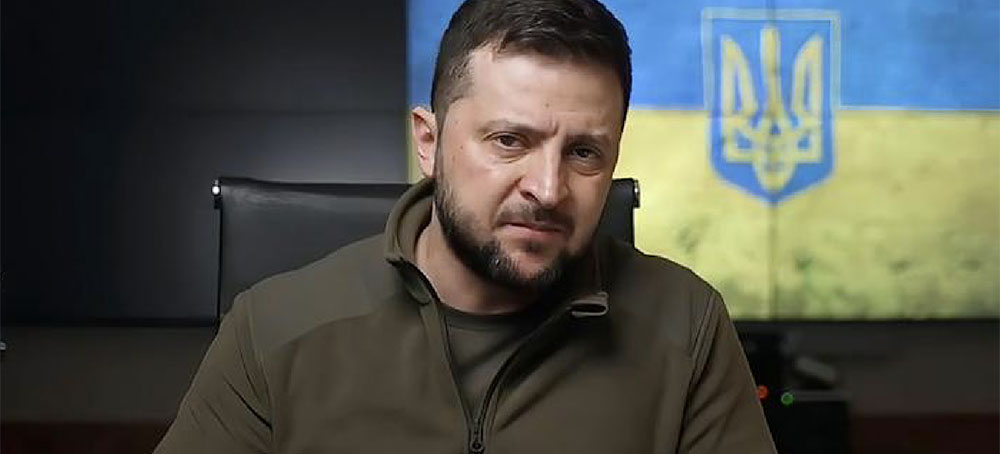 President Volodymyr Zelenskyy of Ukraine. (photo: Yahoo! News)
President Volodymyr Zelenskyy of Ukraine. (photo: Yahoo! News)
"This is the bare minimum that we have to start the de-occupation with. It should be 100% withdrawal of troops to the borders that existed prior to the 24th of February, at least," Zelenskyy told Margaret Brennan during an interview on "Face the Nation" on CBS News.
In the interview on Sunday, Zelenskyy also accused Russian President Vladimir Putin of committing genocide in Ukraine, calling the invasion "the elimination of the whole nation and the people."
Last week, Russia's Defense Ministry announced that it would scale back assaults on the capital of Kyiv amid peace talks between the two countries. One Ukrainian MP said the move was an attempt to "save face," and that Russian forces were really "kicked" out of the city, prompting concerns about whether the Kremlin really wants peace.
"I can't even have a meeting when the shelling is going on. So first the cease-fire. Then we can have a meeting with the Russian president," Zelenskyy said on Sunday. "He's making these authoritarian decisions. What do we need this bloodshed, drama, performance for? Let's simply sit down together the two of us."
Zelenskyy said he and Putin must decide "when the end of the war will come" while still preserving Ukraine's sovereignty.
"How can you imagine leaders of the global countries meeting at the time when the tanks will be still on our territory? So the guns and the cannons and the tanks, cannot dictate us, what the future will be for Ukraine. This is what Russia started when they started the war," he said.
Ukraine and Russia have conducted peace negotiations in Turkey and virtually, during which Ukraine has offered to never join NATO and remain neutral in exchange for significant security guarantees.
Kremlin spokesman Dmitry Peskov said on Saturday that the negotiations were "not easy," Reuters reported.
"Ukraine is a very difficult country, very difficult for us. In its current state it is hostile towards us," Peskov said.
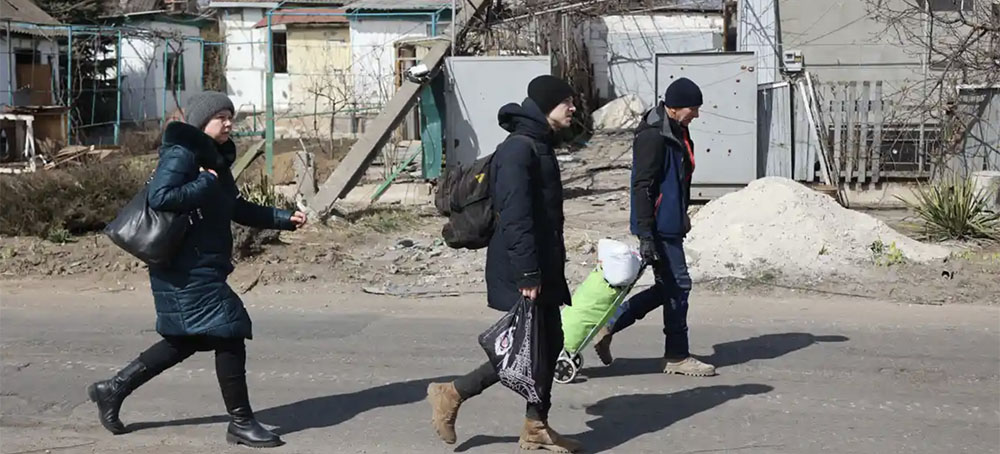 People fleeing the besieged city of Mariupol in Ukraine on Monday. (photo: Anadolu Agency/Getty Images)
People fleeing the besieged city of Mariupol in Ukraine on Monday. (photo: Anadolu Agency/Getty Images)
Troops ordered women and children on to buses and sent them to ‘filtration camps’, according to witness accounts
“On 15 March, Russian troops stormed into our bomb shelter and ordered all the women and children to get out. It was not a choice,” said one woman who had been hiding with her family in a suburb of Mariupol since early March. “People need to know the truth, that Ukrainians are being moved to Russia, the country that is occupying us.”
Ukrainian officials have accused Russian troops of transporting several thousand Mariupol residents through “filtration camps” and forcibly moving them to Russia through the Russian-controlled republics in eastern Ukraine.
The Kremlin spokesperson, Dmitry Peskov, has denied these accusations, claiming “such reports are lies”. Russian officials have previously said 420,000 people have been voluntarily evacuated to Russia “from dangerous regions of Ukraine and the Donetsk and Luhansk people’s republics”.
The women requested anonymity because they were concerned about the safety of their relatives who are still in the heavily shelled city. Their accounts, along with similar stories published by the Washington Post and the BBC and reports from human rights groups, contradict Russian claims that Ukrainians are not being forcibly moved to Russia.
The southern port of Mariupol came under heavy fire from Russian forces soon after the invasion of Ukraine, with many families seeking refuge in bomb shelters. Russian troops have since taken control of large parts of the damaged city.
After leaving her shelter, the first woman said she was bussed with “two or three hundred” others to the border town Novoazovsk, in the Russian-controlled territories in eastern Ukraine.
“Once we came to a stop, we had to wait for hours inside the bus until ordered to go through a large tent complex, to what everyone called ‘filtration camps’.”
A satellite image captured by the US-based Maxar Technologies last week showed tented camps set up in the Russian-controlled village of Bezimenne, near Novoazovsk. Representatives of the two self-proclaimed republics in the Donbas have said they have set up a “tent city of 30 tents” for Mariupol residents, with the capacity to hold up to 450 people.
A report in Rossiyskaya Gazeta, a newspaper owned by the Russian government, said that 5,000 Ukrainians had been processed at the camp in Bezimenne and undergone checks to prevent “Ukrainian nationalists from infiltrating Russia disguised as refugees so they could avoid punishment”.
The woman described how she was photographed and fingerprinted once she entered the camp. She was then “extensively questioned” by men who presented themselves as members of Russia’s FSB security service.
“They went through my phone; they asked if I knew anything about the Ukrainian army, if I had friends in the military,” she said. “They also asked me what I thought about Ukraine, about Putin and about the conflict. It was very degrading.”
After passing through the “filtration camp”, which took a few hours, according to the woman, the group was eventually taken to Rostov, a city 80 miles (130km) east of the Ukrainian border. Once there, the group was told that their final destination would be Vladimir, a city just over 100 miles (160km) east of Moscow.
But in Rostov, the woman decided to separate from the main group, telling the Russian guards she had family living there. “They let me go without much hassle. But for many, leaving was simply not an option,” she said.
The woman recalled that many on the bus complained that they were given only a few minutes to gather their belongings and often did not have any money or official papers, making it complicated to leave Russia afterwards. After separating from the group, the woman made her way first to Moscow by bus and then took a train to St Petersburg. She said she was now safe after crossing the border to an EU country on foot.
The scale of Russia’s reported forced deportations remains unclear. The Helping to Leave Fund, a Russian-run group that addresses the needs of people relocated to Russia from Ukraine, said they had received about 200 requests from deported Ukrainians asking them for help.
“Each of those requests usually comes from a whole family, so the actual number of people deported is higher,” said Maria Ivanova, a representative of the group.
Ivanova said the group saw an increase in requests for help from 28 March and heard first-hand reports of “long lines” at the “filtration camps”.
The reported deportations have raised alarm among international human rights groups.
“These people weren’t given any option to evacuate to a safer place in Ukraine. Many found themselves in a situation when their only choice was essentially crossing into Russia or dying as shelling grew more intense,” said Tatyana Lokshina, associate director for the Human Rights Watch’s Europe and central Asia division.
“Under international human rights law, forced displacement or transfer doesn’t necessarily mean people were forced into a vehicle at gunpoint, but rather that they found themselves in a situation that left them no choice.”
Lokshina pointed to the Geneva convention, under which “individual or mass forcible transfers, as well as deportations of protected persons from occupied territory, are prohibited, regardless of their motive”.
A second woman the Guardian talked to gave a similar account of her forced transport from Mariupol through a “filtration camp” in Novoazovsk.
“I never asked to be taken away. The filtration camps, the journey, it has been very traumatic,” said the woman, who left the city on a Russian bus on 16 March.
She is currently in Rostov, planning her route out of the country.
Russian officials have openly talked about their efforts to relocate what they call “Ukrainian temporarily displaced people.”
The Russian defence ministry has posted almost daily about its efforts to evacuate Ukrainian civilians “trapped” in Mariupol.
The governor of Vladimir told local media that his city had received over 1,000 “refugees” from territories “liberated” by Russia, including Mariupol.
Not everyone who has been moved from Ukraine to Russia said they were unhappy to do so.
“I wanted to go to Russia; I am glad to be safe. And my family lives here, so I was looking for how to get here,” said Vladimira, a third woman from Mariupol who spoke to the Guardian, who has since moved in with family members in Rostov.
Mariupol is just 37 miles from the Russian border, and many of its residents have relatives on the other side. While the invasion has dramatically decreased pro-Russian sentiment in the city, Vladimira said she welcomed the safety that she felt moving to Russia offered.
She also confirmed that she had gone through “filtration camps” but said they did not bother her as she was just “glad to be out of danger”.
“There is certainly a group of people that have been moved out of Mariupol who will not mind being in Russia. Who will stay there,” said Ivanova from the Helping to Leave Fund. “But we know of hundreds who were moved against their will. That is extremely worrying.”
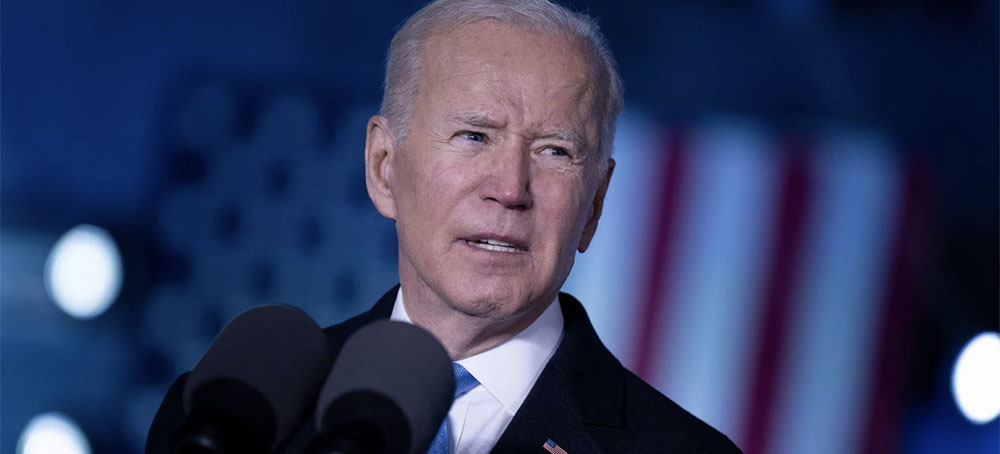 President Biden delivers a speech about the Russian war in Ukraine at the Royal Castle in Warsaw, Poland. (photo: Brendan Smialowski/AFP/Getty Images)
President Biden delivers a speech about the Russian war in Ukraine at the Royal Castle in Warsaw, Poland. (photo: Brendan Smialowski/AFP/Getty Images)
“You saw what happened in Bucha,” Biden said. He added that Putin “is a war criminal.”
Biden’s comments to reporters came after Ukraine President Volodymyr Zelenskyy visited Bucha, one of the towns surrounding Kyiv where Ukrainian officials say the bodies of civilians have been found. Zelenskyy called the Russian actions “genocide” and called for the West to apply tougher sanctions against Russia.
Biden, however, stopped short of calling the actions genocide.
The bodies of 410 civilians have been removed from Kyiv-area towns that were recently retaken from Russian forces, Ukraine’s prosecutor-general, Iryna Venediktova, said. Associated Press journalists saw the bodies of at least 21 people in various spots around Bucha, northwest of the capital.
“We have to continue to provide Ukraine with the weapons they need to continue the fight. And we have to gather all the detail so this can be an actual -- have a war crimes trial,” Biden said.
Biden lashed out at Putin as “brutal.”
“What’s happening in Bucha is outrageous and everyone sees it,” Biden added.
White House officials said talks about ramping up new sanctions against Russia intensified after reports of alleged atrocities emerged. Biden said Monday that he would continue to add sanctions but did not detail what sectors the U.S. may target next.
After unveiling an avalanche of sanctions in the first weeks of the war, administration officials in recent days have put more focus on closing loopholes that Russia might try to use to avoid sanctions.
European Commission President Ursula von der Leyen tweeted Monday that the European Union will send investigators to Ukraine to help the local prosecutor general “document war crimes.”
A Russian law enforcement agency says it has launched its own investigation into allegations that Ukrainian civilians were massacred in suburbs of Kyiv that were held by Russian troops, focusing on what it calls “false information” about Russian forces.
The Investigative Committee claims Ukrainian authorities made the allegations “with the aim of discrediting Russian troops” and that those involved should be investigated over possible breaches of a new Russian law banning what the government deems to be false information about its forces.
Biden noted that he faced pushback last month when he described Putin as a war crimina l for the unfolding onslaught in Ukraine after hospitals and maternity wards were bombed. In his remarks on Monday, Biden made clear that label still applied.
“This guy is brutal and what’s happening to Bucha is outrageous, and everyone’s seen it,” Biden said.
Investigations into Putin’s actions had begun before the new allegations of atrocities outside Kyiv.
The U.S. and more than 40 other countries are working together to investigate possible violations and abuses, after the passage of a resolution by the United Nations Human Rights Council to establish a commission of inquiry. There is another probe by the International Criminal Court, an independent body based in the Netherlands. The U.S. Senate unanimously approved a resolution last month seeking investigations of Putin and elements of his government for war crimes over the invasion of Ukraine.
Meanwhile, Biden’s chief envoy to the United Nations, Ambassador Linda Thomas-Greenfield, announced Monday that the U.S. plans to seek a suspension of Russia from its seat on the U.N.’s top human rights body in the wake of more indications Russian forces may have committed war crimes in Ukraine. That would require a decision by the U.N. General Assembly.
Russia and the other four permanent members of the U.N. Security Council – Britain, China, France and the United States – all currently have seats on the 47-member-state rights council, which is based in Geneva. The United States rejoined the council this year.
“My message to those 140 countries who have courageously stood together is simple: the images out of Bucha and devastation across Ukraine require us now to match our words with action,” Thomas-Greenfield said. “We cannot let a Member State that is subverting every principle we hold dear to continue to sit on the UN Human Rights Council.”
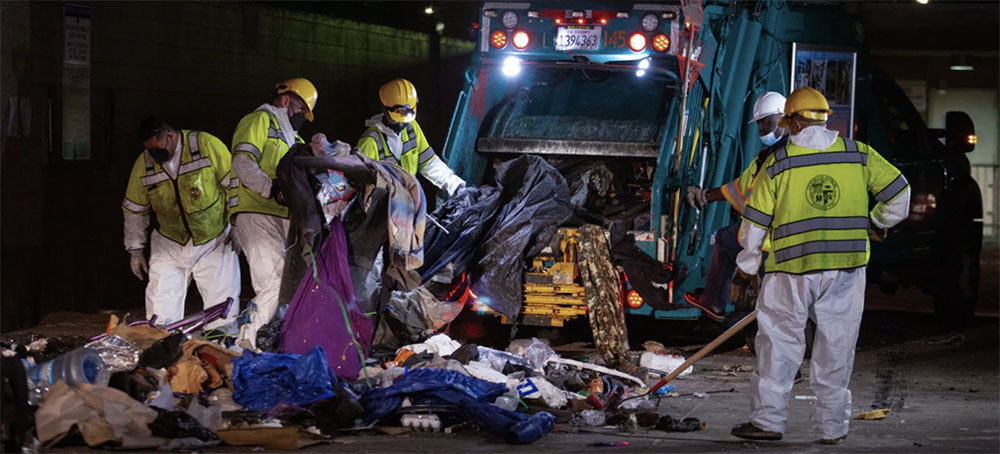 Sanitation workers clear an encampment of unhoused people in Los Angeles, Calif., on March 17, 2022. (photo: Jason Armond/LA Times/Getty Images)
Sanitation workers clear an encampment of unhoused people in Los Angeles, Calif., on March 17, 2022. (photo: Jason Armond/LA Times/Getty Images)
New York’s Eric Adams became the latest mayor to clear out the unhoused — a cruel reminder of how the liberal establishment fails the neediest.
In New York City alone, Mayor Eric Adams in March ordered the clearance of hundreds of homeless encampments; he recently announced that 239 of 244 sites had been removed, primarily in Manhattan. With hardly any notice, dozens and dozens of unhoused people saw their tents, mattresses, and makeshift shelters swept into garbage trucks. The mayor’s claim that these sweeps are about moving individuals into safe shelter was immediately belied by the fact that only five people whose encampments were destroyed have accepted a shelter bed.
In Seattle, after a weekslong standoff between police and activists attempting to protect a homeless encampment, cops cleared the space on March 2. Los Angeles has seen multiple sites where the unhoused erected temporary shelters swept away this year in militarized raids. Dozens of encampments have been cleared in Portland. According to the National Coalition for the Homeless, at least 65 U.S. cities are criminalizing or sweeping encampments.
Many of the major cities carrying out sweeps are under Democratic leadership — a grim reminder that necropolitical population management is a bipartisan approach. And they have a lot of targets and victims in their war: Over half a million people across the U.S. experience homelessness on any given night. While a number of politicians from the Democratic Party’s left flank, including New York state Sen. Julia Salazar and New York City Council Member Jennifer Gutiérrez, have criticized the violent displacement of unhoused communities, the liberal establishment continues to pledge allegiance to market forces.
Meanwhile, policies that criminalize poverty — from the war on drugs to the penalization of panhandling — create a steady flow of bodies into the glutted prison-industrial complex, creating a near-inescapable cycle of immiseration and incarceration.
None of the excuses given for carrying out these cruel policies hold any water. Each and every mayor who has enforced encampment clearance has made claims to public safety, citing upticks in crime and alleged concern for unhoused people themselves.
In New York, Adams’s disdain for the unhoused has been laid bare. “This is the right thing to do because there is no freedom or dignity in living in a cardboard box under an overpass,” he said last week, claiming that it would take time to build trust such that unhoused people would accept shelter beds. Given his already young record, Adams’s remarks about dignity are laughable. He cut $615 million from the city’s homeless services agency — a fifth of its operating budget — while dramatically increasing the policing of homelessness on the subways. He has referred to homelessness as a “cancerous sore.”
Instead of offering dignity, freedom, and resources, here’s what Adams offers unhoused New Yorkers: to be criminalized, forced to choose between street sleeping without the relative security of an encampment and accepting a bed in a shelter system renowned for violence and poor management.
Plans to turn empty hotels into semipermanent housing have stalled and look ever more imperiled as New York’s embattled tourist industry rebounds. Adams announced the creation of hundreds more safe-haven shelter beds, which offer more resources than normal city shelters — a welcome move, but a Band-aid over a bullet wound, which will grow ever more fatal through a budget that prioritizes policing and treats health care and housing with austerity logic.
Where are the unhoused supposed go when their temporary shelters are destroyed? In Los Angeles, city officials are embracing the clearance of encampments deemed eyesores, but homelessness advocates and service providers continuously assert that there is not enough temporary or permanent housing for those displaced by raids. The same is true in every major city.
“The policy of criminalizing homelessness has never worked,” Georgia Berkovich, director of public affairs at the Midnight Mission, which offers emergency and social services to unhoused people in LA, told NBC. “We need more beds. We need more housing.”
The sentiment has been echoed by longtime organizers and homelessness organizations nationwide. “Private rooms and permanent housing. That’s what people want,” Jacquelyn Simone, the policy director for the Coalition for the Homeless, told the New York Times. “You don’t have to do heavy-handed policing to convince someone to come in off the streets if you’re actually offering them an option that is safer and better than the streets.”
Those on the front lines of this work have been unwavering on this line: Carceral approaches and sweeps aiming to remove homelessness from sight — and consistently into jails and prisons — have never worked as solutions to the humanitarian crisis unhoused people face. It would take extraordinary credulity, after decades of war on the poor, to think that city officials choosing these policies again and again have the well-being of the poorest in mind.
There is more than ample evidence that “broken windows” policing, of which encampment sweeps are a part, entrench rather than counter poverty. Where the liberal establishment fails to serve the poor with encampment sweeps, it succeeds in offering cleared space to tourists and real estate interests.
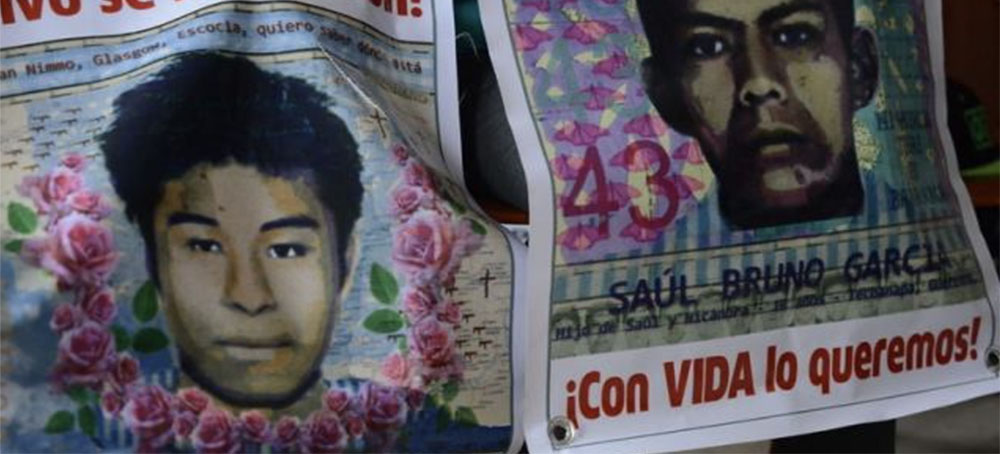 Parents of the 43 disappeared students meet with experts from the Inter-American Commission on Human Rights in Guerrero, Mexico, September 29, 2015. (photo: Daniel Cima/CIDH)
Parents of the 43 disappeared students meet with experts from the Inter-American Commission on Human Rights in Guerrero, Mexico, September 29, 2015. (photo: Daniel Cima/CIDH)
Following a new report, families of the 43 students criticized the government of President Andrés Manuel López Obrador for failing to follow through on promises to finally solve the case.
The response from the families of the disappeared students came after the Interdisciplinary Group of Independent Experts (GIEI) charged with investigating the case released its third report on March 28. The report confirms that the Mexican military participated in the students’ disappearance and that authorities worked to distort the facts in presenting the “historical truth.”
That’s what the government of former president Enrique Peña Nieto called its official version of events, in which it argued that the students were detained by police in Iguala, handed over to members of an organized crime group, and then killed and incinerated in a trash dump in Cocula.
The GIEI’s investigations have cast doubt on the narrative since 2015. The independent experts got involved in the case after complaints of irregularities in the official version of events.
The group’s most recent report also includes a video that shows marines entered, interfered with, and manipulated the Cocula trash dump to construct the “historical truth.”
The GIEI also reported that the military designed a counterinsurgency strategy with which it infiltrated the Ayotzinapa teacher’s college to spy on students’ activities. The military was surveilling the students in real time as they were attacked by police and criminals in Iguala in the night between September 26 and 27, 2014.
After the latest revelations, the parents of the disappeared students called for investigations into both the Mexican military and former president Peña Nieto to clarify their participation in the case.
Broken Promises
In a press conference on March 29, the mothers and fathers of the disappeared students also demanded a meeting with President Andrés Manuel López Obrador, with whom they say they have not been in contact since September 2021.
María Elena Guerrero, mother of one of the 43, Giovanni Galíndez, said the families didn’t think that after three years with a government that describes itself as the “Fourth Transformation,” there would still be no information about the students’ whereabouts.
For her part, Cristina Bautista, mother of the disappeared student Benjamín Ascencio, stressed that the GIEI report should prompt an investigation into the military “because that is where there are obstacles and we cannot find the truth.”
Emiliano Navarrete, father of the student José Ángel Navarrete González, said that in Mexico, the poor don’t get justice, and that the investigation into the disappearance of the 43 students is proof of that fact. He noted that, since the previous government was in power, there has been sufficient reason to suspect the military’s involvement in the crime.
Navarrete also criticized the current administration’s actions, arguing that because state institutions don’t listen to the president, barriers to accessing information and furthering investigations remain.
“[The president] should focus a little less on the mañaneras and a little more on the commitments he has with the people,” Navarrete said, referring to López Obrador’s daily press briefings, which sometimes last as long as three hours. “It is upsetting to see that federal government institutions keep withholding information. If they hid this from us, what else have they hidden? He who lies once lies twice and three times. And the government only uses power for itself, and it does not give justice to the people.”
For Mario González, actions like the creation of the Truth and Justice Commission for the Ayotizinapa case, created when López Obrador came to power, show that state institutions have been toying with the families for the past three years. Just two days after López Obrador took office at the end of 2018, federal authorities committed to releasing all information related to the case “knowing we wouldn’t find anything,” said González.
“How are we not going to be angry if, after three years, information comes out that should have been released at the time?” González continued. “How are we not going to be angry if we don’t know anything about [what happened to] our children?”
Toward Justice?
In the press conference, Vidulfo Rosales, legal representative of the families of the disappeared students, stated that one thing is clear from the latest GIEI report: the manipulation of the Cocula trash dump reveals that there was an effort to befoul the investigation and cover up the truth.
According to Rosales, this effort complicated the exploration of other lines of investigation over the course of at least five years. At the same time, he argued that there is no difference between the previous and current federal government with respect to the Ayotzinapa case because, in the more than three years since the creation of the Truth and Justice Commission, the heads of the Navy and National Defense have refused to collaborate with the investigations.
“It’s one thing to deliver [information] to the GIEI and another to take concrete steps toward establishing responsibility,” Rosales said. Despite the publication of the expert report, the evidence it reveals has not concretely entered into the investigation, so the prosecutor’s office will have challenges leveraging the GIEI’s report into legal channels.
According to the GIEI, the military also conducted investigations that have not been shared to help shed light on the facts. The experts warned that relevant information remains in the hands of the military and security forces that “has been omitted in the documents delivered to both the GIEI and the special prosecutor, as well as in the declarations of military officials, including: information about a military patrol at the Palace of Justice in Iguala; omission of reports from toll booth three on the highway, where soldiers were deployed; and that the students [were detained in the Palace of Justice] that night.”
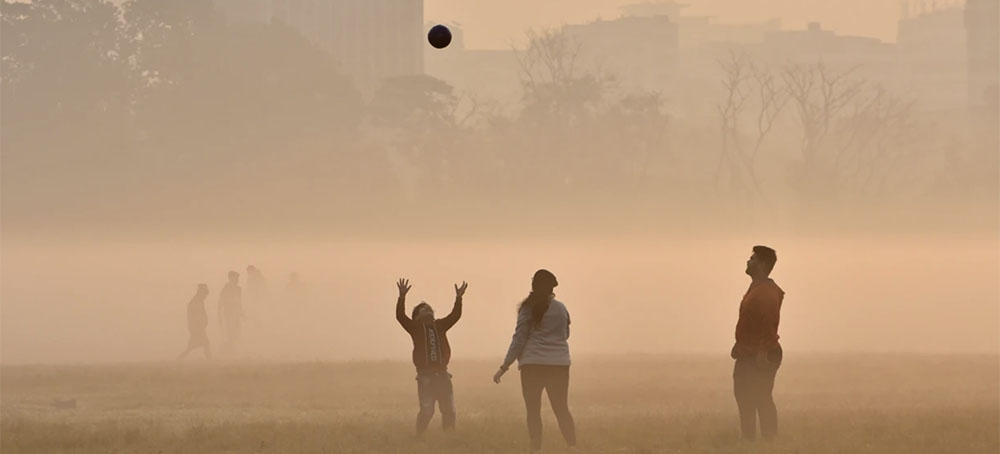 A child plays with a ball through amid dense smog in Kolkata, India, on Dec. 15, 2021. (photo: Indranil Aditya/Nur Photo/AP)
A child plays with a ball through amid dense smog in Kolkata, India, on Dec. 15, 2021. (photo: Indranil Aditya/Nur Photo/AP)
Particulate matter has many sources, such as transportation, power plants, agriculture, the burning of waste and industry — as well as from natural sources like desert dust.
The World Health Organization, about six months after tightening its guidelines on air quality, on Monday issued an update to its database on air quality that draws on information from a growing number of cities, towns, and villages across the globe — now totaling over 6,000 municipalities.
WHO said 99 percent of the global population breathes air that exceeds its air-quality limits and is often rife with particles that can penetrate deep into the lungs, enter the veins and arteries, and cause disease. Air quality is poorest in WHO’s Eastern Mediterranean and Southeast Asia regions, followed by Africa, it said.
“After surviving a pandemic, it is unacceptable to still have 7 million preventable deaths and countless preventable lost years of good health due to air pollution,” said Dr. Maria Neira, head of WHO’s department of environment, climate change and health. “Yet too many investments are still being sunk into a polluted environment rather than in clean, healthy air.”
The database, which has traditionally considered two types of particulate matter known as PM2.5 and PM10, for the first time has included ground measurements of nitrogen dioxide. The last version of the database was issued in 2018.
Nitrogen dioxide originates mainly from human-generated burning of fuel, such as through automobile traffic, and is most common in urban areas. Exposure can bring respiratory disease like asthma and symptoms like coughing, wheezing and difficulty in breathing, and more hospital and emergency-room admissions, WHO said. The highest concentrations were found in the eastern Mediterranean region.
Particulate matter has many sources, such as transportation, power plants, agriculture, the burning of waste and industry — as well as from natural sources like desert dust. The developing world is particularly hard hit: India had high levels of PM10, while China showed high levels of PM2.5, the database showed.
“Particulate matter, especially PM2.5, is capable of penetrating deep into the lungs and entering the bloodstream, causing cardiovascular, cerebrovascular (stroke) and respiratory impacts,” WHO said. “There is emerging evidence that particulate matter impacts other organs and causes other diseases as well.”
The findings highlight the sheer scale of the changes needed to combat air pollution, said Anumita Roychowdhury, an air pollution expert at Center for Science and Environment, a research and advocacy organization in New Delhi.
India and the world need to brace for major changes to try to curb air pollution: electric vehicles; a shift away from fossil fuels; a massive scaling-up of green energy; and households separating their types of waste, she said.
The Council on Energy, Environment and Water, a New Delhi-based think tank, found in a study that more than 60 percent of India’s PM2.5 loads are from households and industries.
Tanushree Ganguly, who heads the council’s program on air quality, called for action toward reducing emissions from industries, automobiles, biomass burning and domestic energy.
“We need to prioritize clean energy access for households that need it the most, and take active measures to clean up our industrial sector,” she said.
Special Coverage: Ukraine, A Historic Resistance
READ MORE
Follow us on facebook and twitter!
PO Box 2043 / Citrus Heights, CA 95611




No comments:
Post a Comment
Note: Only a member of this blog may post a comment.